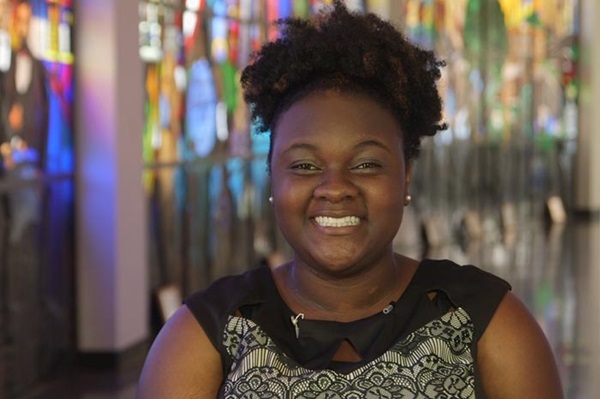College student Keyonna Morgane of Memphis comes from a broken home, but that didn't affect her outlook on life or her drive to succeed.
She grew up with her grandparents and has fond memories of her childhood.
"We got to be kids. We were always outside. We were in camp. I think they really allowed me to become a people person, allowed me to get to know myself a little bit, just hanging around with other kids."
Her grandfather was a church elder and minister who started her on her faith journey.
"He always instilled in us that your spiritual life was first, most important. I feel like if that's lined up everything else would fall in place," she says.
Morgane currently attends Wiley College in Marshall, Texas, where she is majoring in education. The school is one of the 11 Historically Black Colleges and Universities supported by The United Methodist Church through its Black College Fund.
Attending a historically black college was an easy choice for Morgane. Her stepmother attended Fisk University in Nashville and helped steer her in that direction.
"Wiley seemed to have chosen me. Wiley wrapped me in their arms. They were like, 'Here is money. Here is a scholarship for you.' "
Her goal is to be an elementary school teacher. She also wants to earn her master's degree so that she can become a school principal one day.
Morgane says attending Wiley has changed her life.
"My leadership skills have tremendously grown. My spiritual life has ... grown and matured. I've grown a personal relationship with God," she says.
She also is committed to giving back to Wiley and her community. She's a member of the Delta Sigma Sorority, a community service-oriented organization, and serves as a Wiley student ambassador, welcoming new and prospective students.
"I'm just giving back what they've already given to me," she says.
She's also involved with the Student Support Services program (SSS), which assists undergraduate students who are first-generation, low-income and/or disabled so that they reach their goal of graduating college. The program provides tutoring and offers travel opportunities.
"Because I'm a first-generation college student, I've had many struggles along the way. … But one thing I would say is, no matter what happens, if you're a first-generation college student, you have to push forward."
Without the Black College Fund, Morgane says, she wouldn't be where she is today.
"The Black College Fund not only supports students, but it keeps people who normally wouldn't attend college out of trouble, I feel. When you think about students obtaining funds from the Black College Fund, think of a student or a person that you're taking off the street. That's essentially what the Black College Fund does.
"It allows students … who come from poverty a chance to look forward to something."
She says although her parents didn't make it to college, they always instilled in her the importance of an education.
"I just feel as African-Americans we have come so far, why stop here? They always say you should always go further than the generation before you, and I plan to do that. And I also plan for my children to go further than me. Education is ... that block that you have to climb to get to where you want to go in life."
Julie Dwyer, general church content editor, United Methodist Communications
One of seven apportioned giving opportunities of The United Methodist Church, the Black College Fund provides financial support to maintain solid, challenging academic programs; strong faculties; and well-equipped facilities at 11 United Methodist-related historically black colleges and universities. Please encourage your leaders and congregations to support the Black College Fund apportionment at 100 percent.





